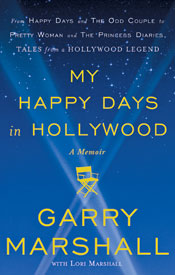(Crown Archetype, 290 pages, $25 )
By Garry Marshall
 Garry Marshall never made the claim, nor set out to be, a “great filmmaker,” but as creator and director of the wildly popular sitcoms Happy Days, Laverne & Shirley and Mork & Mindy, he made mainstream America laugh for well over a decade and, as a feature director, he still does.
Garry Marshall never made the claim, nor set out to be, a “great filmmaker,” but as creator and director of the wildly popular sitcoms Happy Days, Laverne & Shirley and Mork & Mindy, he made mainstream America laugh for well over a decade and, as a feature director, he still does.
Marshall’s My Happy Days in Hollywood: A Memoir paints a vivid portrait on the panoramic canvas of his five-decade career. From his stickball days as a fast-talking, wise-cracking kid in the Bronx (“My mother was the first director I ever met”); learning on his feet from Carl Reiner and Sid Caesar in the knockabout golden age of live television; his hugely successful television career of the 1970s and early ’80s; to hit films such as Pretty Woman and The Princess Diaries, the book confirms how deeply Marshall’s work has seeped into our cultural consciousness. (Not only do most Americans of a certain age know Arthur Fonzarelli and his leather jacket, that jacket made it to the Smithsonian Institution.)
Marshall says he still views himself as “a kid from the Bronx” whose years in Hollywood have not diminished his famous accent—which comes through loud and clear in his memoir—nor has it altered his grounded, straightforward approach to his work. Marshall likes to run a good-natured, tight-knit set, “making friends with everyone,” but he’s no pushover. He fought to preserve his directorial vision on Pretty Woman when the studio tried to rob the story of its modern-day fairy tale charm. Then there was the time he arbitrated between a feuding Cindy Williams and his sister Penny Marshall on the turbulent Laverne & Shirley set. Marshall makes no pretense about his directorial process and is full of praise for his collaborative team. He even gives credit for the inspiration for Mork & Mindy to his then-Star Wars obsessed 8-year-old son who explained to him the reason he didn’t watch Happy Days was because it didn’t have any space aliens. To which Marshall comments, “There are times you are insanely grateful to have children.”
Marshall’s memoir is much like an episode of one of his classic TV shows. Warm, congenial, and often laugh-out-loud funny, it’s full of the optimistic, glass-is-half-full philosophy that has guided his life and work.
Review written by Carley Johnson.